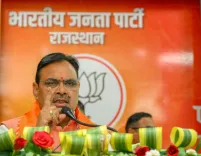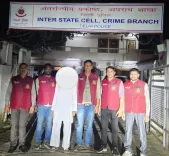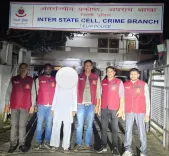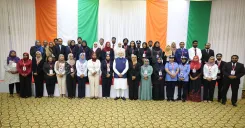Year End Reflection: 2024 as a Year of Civilizational Awakening
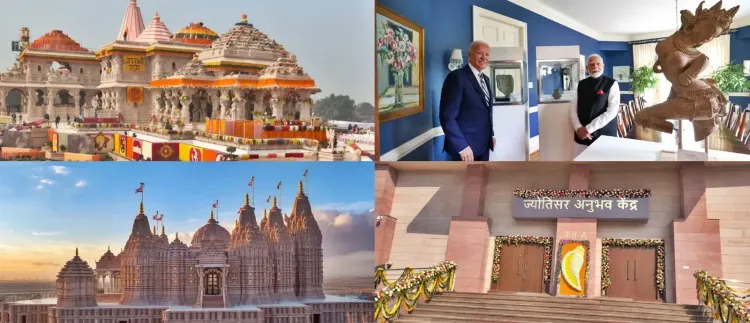
New Delhi, Dec 31 (NationPress) In the span of 10 years under the Modi administration, India has experienced an extraordinary cultural renaissance, reigniting a sense of pride in its extensive heritage. Efforts such as the restoration of ancient temples in Jammu and Kashmir and the revitalization of spiritual corridors like the majestic Kashi Vishwanath Dham have been pivotal in reconnecting us with our origins.
Reviving the legacies of forgotten saints like Meera Bai and tribal figures such as Bhagwan Birsa Munda has been a focus, alongside promoting traditions like the Mahakumbh on an international scale, showcasing India’s spiritual magnificence. Unprecedented celebrations, such as Diwali in Ayodhya and the placement of the revered Sengol in Parliament, illustrate a profound reverence for our civilizational ethos. This year marks the continuation of a decade-long endeavor aimed at ensuring that India’s heritage inspires future generations to value and uphold its ageless spirit.
The year commenced with the historic consecration of Shri Ram Lala in Ayodhya, realizing a centuries-old aspiration held dear by millions, along with the inauguration of the first Hindu temple in Abu Dhabi, symbolizing India’s spiritual legacy transcending borders.
Shri Ram returns to his birthplace
Under PM Modi’s guidance, 2024 witnessed a profound revitalization of India’s cultural heritage and civilizational pride. The consecration of Ram Lala at the Ayodhya Ram Mandir marked a pivotal cultural and spiritual milestone, fulfilling a long-held dream of Hindus globally.
This event highlighted Ayodhya’s lasting importance in India’s civilizational story. The inauguration of the BAPS Mandir by PM Modi, the first Hindu temple in the Middle East, was a significant chapter in India’s cultural diplomacy, constructed according to ancient Hindu architectural principles known as Shilpa Shastras.
It celebrated the contributions of the Indian diaspora while also embodying global interfaith unity. Furthermore, the commencement of the Maa Kamakhya Divya Pariyojana, a significant corridor project, aims to enhance access to the revered Maa Kamakhya Temple in Assam while preserving its sacred heritage. These initiatives are a testament to PM Modi’s unwavering dedication to reviving India’s heritage and instilling pride in its illustrious past.
Reinvigoration of Cultural Heritage
In 2024, under the visionary leadership of PM Modi, India made substantial progress in safeguarding and celebrating its civilizational heritage. The recognition of Moidams in Assam as India’s 43rd UNESCO World Heritage Site underscores the global importance of India’s cultural legacy. The launch of Anubhav Kendra in Kurukshetra breathed life into ancient texts like the Mahabharata and Bhagavad Gita, demonstrating the government's commitment to making India’s heritage accessible and immersive.
Moreover, the redevelopment of the historic Kochrab Ashram in Gujarat reinforced the government’s commitment to preserving Gandhian principles, while the laying of the foundation stone for Shri Kalki Dham in Sambhal highlighted efforts to cultivate spiritual and cultural hubs. These actions reflect the Modi administration’s intent to preserve India’s ancient wisdom while navigating a progressive future.
In FY24, the Khadi and Village Industries Commission (KVIC) surpassed Rs 1.5 lakh crore in turnover and generated 1 million jobs, embodying the Atmanirbhar Bharat initiative. This growth emphasizes Khadi’s ascent as an eco-fashion statement, fueled by Vocal for Local, merging tradition with sustainability and modern innovation.
Celebrating Linguistic and Spiritual Heritage
The year 2024 also witnessed India honoring its linguistic diversity with the designation of Classical Language status to Assamese, Bengali, Marathi, Pali, and Prakrit. This affirmation not only pays tribute to the country’s rich linguistic tapestry but also supports cultural preservation across generations. Additionally, the reopening of all four gates of the Shri Jagannath Temple in Puri on June 13, 2024, fulfilled a long-standing request from devotees, restoring access to this cherished spiritual site.
The renaming of Port Blair to 'Sri Vijaya Puram' on September 13, 2024, further highlighted India’s commitment to honoring its history, particularly the region’s significance in the freedom struggle.
India is also preparing for the Maha Kumbh Mela 2025, scheduled to occur in Prayagraj from January 13 to February 26, 2025. This event is expected to be one of the largest spiritual congregations globally, attracting an estimated 450 million devotees and visitors.
Cultural Diplomacy and Global Recognition
The year 2024 marked India’s significant advancements in cultural diplomacy, solidifying its global standing. India and the USA formalized their first-ever Cultural Property Agreement, designed to safeguard India’s priceless cultural artifacts from illicit trafficking.
On November 15, 2024, the USA returned over 1,400 looted artefacts valued at approximately $10 million to India. In September 2024, a ceremonial event featuring Indian Prime Minister Narendra Modi and US President Joe Biden saw the return of 297 antiquities to India. Additionally, in a landmark event, 100 female artists led the Republic Day Parade for the first time, emphasizing the government’s dedication to women’s empowerment and gender equality.
These endeavors exemplify India’s expanding cultural influence, with PM Modi’s vision propelling the nation towards increased global acknowledgment while honoring its rich traditions.
Infrastructure and Economic Growth Linked to Cultural Projects
In 2024, under PM Modi’s leadership, India embarked on transformative projects that seamlessly integrated cultural initiatives with infrastructure and economic growth. The announcement of corridor developments for the Vishnupad Temple in Bihar and the Mahabodhi Temple in Bodh Gaya is set to enhance spiritual tourism and provide a significant economic boost to these areas. By improving access to two of India’s most sacred locations, these endeavors will connect India’s spiritual heritage with contemporary infrastructure.
The foundation stone for the National Maritime Heritage Complex in Lothal, Gujarat was also laid, a crucial step in preserving India’s ancient maritime legacy. Lothal is set to be developed as the world’s oldest dockyard and a historic site of the Indus Valley Civilization, showcasing our rich maritime history spanning over 4,500 years. The execution of this initiative is projected to create around 22,000 jobs, with 15,000 direct and 7,000 indirect jobs, stimulating local economies and promoting sustainable development for communities.
Cultural Celebrations and Initiatives
PM Modi inaugurated the first Bodoland Mohotsav in Delhi, celebrating the unique culture, traditions, and history of the Bodoland region. He also launched the Ashtalakshmi Mahotsav, which highlighted the rich cultural heritage of the Northeast. These cultural festivities reinforce PM Modi's vision to safeguard and promote India’s diverse cultural identity while uniting people from various backgrounds.


